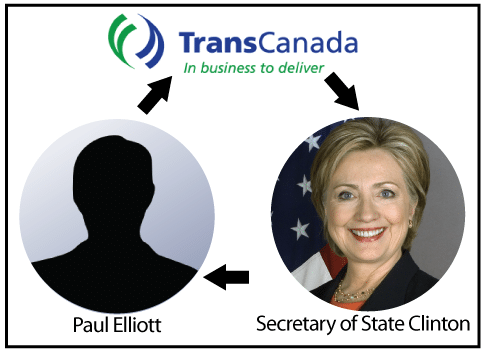Friends of the Earth today filed a request with the U.S. Department of Justice [PDF] asking the DOJ to investigate whether Paul Elliott, the notorious TransCanada tar sands lobbyist with deep ties to Secretary of State Hillary Clinton, failed to disclose his foreign agent status when lobbying the State Department about the controversial Keystone XL pipeline.
FOE requests that DOJ take a close look at whether Elliott violated the Foreign Agents Registration Act (FARA), a matter of increasing interest in the wake of FOE‘s earlier release of documents revealing that Elliott tried to exploit relationships he made while working on Hillary Clinton’s presidential campaign in order to promote the Keystone XL for his new employer, TransCanada.
As the Washington Post reported earlier this month, the documents that FOE obtained through the Freedom of Information Act (FOIA) – after having to file a lawsuit to compel the State Department to release them – also show that Elliott lobbied the State Department on TransCanada’s behalf for more than a year before officially registering as a lobbyist.
As Huffington Post’s Lucia Graves pointed out today, the Foreign Agents Registration Act holds that all persons acting as agents of foreign corporations disclose their relationship with the foreign principal, as well as any activities and disbursements in support of those activities.
The FOIA documents seem to suggest that Elliott did not comply with this law.
Friends of the Earth President Erich Pica issued the following statement:
“The American people need to know when foreign entities are trying to influence the actions of the U.S. government. Unfortunately, the Canadian oil corporation behind the Keystone XL pipeline was trying to do just that, and its top lobbyist failed to disclose what he was up to. The Justice Department has a responsibility to investigate this serious violation of law.”
“Moreover, State Department officials must explain why they maintained a cozy relationship with this unregistered foreign agent while he lobbied them illegally. Why did State Department officials provide insider information and coaching to Mr. Elliott and TransCanada? This is more evidence that the State Department has failed to meet its responsibility to conduct a thorough, unbiased review of the proposed pipeline.”
In the meantime, enjoy a message from Hillary Clinton’s State Department Oil Services…
Subscribe to our newsletter
Stay up to date with DeSmog news and alerts







